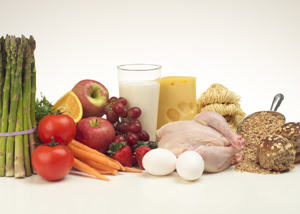Nutrition
 Your eating habits can help maintain good health or improve poor health.
Your eating habits can help maintain good health or improve poor health.
What you should know:
- Being overweight can be a special problem for people with Hemophilia. They may bleed more often because the excess weight puts a strain on their joints. They may also have trouble finding their veins when they take factor. Overweight people have to take larger doses of factor, so they have higher medical costs.
- Your diet can affect your chances of having heart disease, high blood pressure, cancer, diabetes, gallbladder disease, osteoporosis, and other health problems.
- Eating a variety of foods will help you get the energy, protein, vitamins, minerals, and fiber you need for good health.
- Reading the labels on foods can help you plan a healthy diet. The label can tell you how much sodium, fat, cholesterol, and sugar are in the food.
- You should eat foods that are low in fat and cholesterol. This will reduce your risk of heart disease and certain types of cancer. A diet low in fat can help you keep a healthy weight.
- By not eating foods that have a lot of sugar and fat (“junk foods”), you can avoid overworking your liver. A person with Hemophilia who has hepatitis should try to keep their liver as healthy as possible.
- You don’t have to stop eating foods that are high in fat, cholesterol, and sodium completely. It’s the amount you eat over several days and not the amount you eat in one meal that is important. If you eat a high-fat food or meal, balance it out by eating only low-fat foods for the next day or two.
- Snacking between meals on sweet or gummy foods like raisins or chewy candies can cause tooth decay. Sugar in the mouth or sugar that sticks to the teeth for a long time causes germs in the mouth to produce acid. These acids eat through the enamel covering on the teeth and cause cavities. It is best to eat sweets with meals and to brush or rinse afterwards. Milk and cheeses, especially Swiss, cheddar, and Monterey Jack, make good snacks since they have calcium to build strong teeth and bones.
- Young children should never be put to bed with a bottle of milk or juice. The liquid will pool around their teeth and cause decay.
- If you drink alcohol, do so in moderation. This means no more than one drink per day for women and no more than two drinks per day for men. Alcoholic drinks give you calories but little or no nutrients. A person with hepatitis C should not drink alcohol. Alcohol can further damage the liver.
- In the early 1960s, some doctors reported that eating peanuts and peanut butter improved blood clotting in people with Hemophilia. This was later shown to be untrue.
Balancing calories, diet, and exercise
Except for water, all the foods we eat have calories. Calories that are not used are stored in our bodies as fat. The way to lose this fat is to eat fewer calories, exercise enough to burn the calories, or both. Crash diets, making yourself vomit, or taking laxatives to lose weight can be harmful. These methods can cause chemical changes in your body. This can lead to problems such as heart ailments. If you want to lose weight, ask your doctor for help.
Regular exercise will help you control your weight by burning calories. Another benefit of exercise is that your muscles, including your heart, get in better shape. Your endurance can be improved, and you can become more agile. Strong muscles also protect joints and reduce the number of bleeds.
